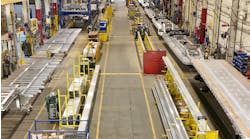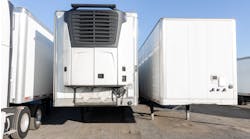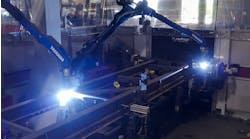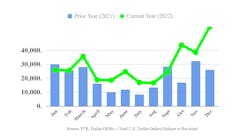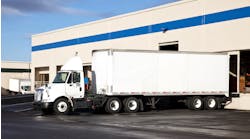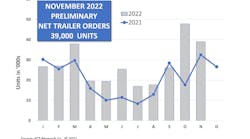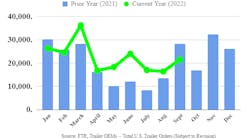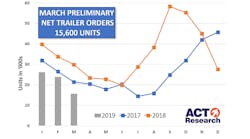ACT Research and FTR Intel reported declining trailer orders in March.
ACT’s preliminary estimate is 15,600 net trailer orders, with final volume for March expected later this month. The company’s methodology allows it to generate a preliminary estimate within +/-3% of the final tally.
“It appears that the industry entered a bit of a holding pattern in March, as order volume declined significantly from both the previous month and this time last year,” said Frank Maly, ACT’s director of commercial vehicle transportation analysis and research. “Net orders dropped 35% from February and were approximately 48% below a year ago.
“Although current backlogs consume the majority of available build slots this year, particularly in the dry van and reefer segments, we continue to hear that OEMs are reluctant to fully open the 2020 order boards. Their concerns center around materials and component pricing, which would obviously have measurable impact on future pricing.
“While some fleets appear to be willing to extend commitments, others might be waiting, monitoring current market conditions. Also worth noting, given extended backlogs, OEMs are pushing to deliver trailers as quickly as possible. Preliminary information indicates production crossed the 30,000-unit mark last month for only the second time in industry history.”
Meanwhile, FTR’s preliminary March estimate is lower, with only 13,500 trailer orders, the smallest monthly total since September 2016 and lowest March since 2008. Recent comparisons also were negative, minus-43% month over month and minus-52% year over year. Trailer orders for the past 12 months now total 371,000 units.
Dry van orders were particularly low, with few build slots available left in 2019. Vocational trailer orders also continue to fall. The low level of trailer order activity in March should result in backlogs finally beginning to move down from record levels.
“This low order number is not surprising,” said Don Ake, FTR vice president of commercial vehicles. “Backlogs had fallen little so far in 2019, and are at unreasonable levels. Fleets still need more trailers, based on the robust production, so demand has not changed in the short run. The weak orders are totally the result of the lack of available production openings.
“However, cancellations will continue to be a factor due to a large, fluid backlog.”

